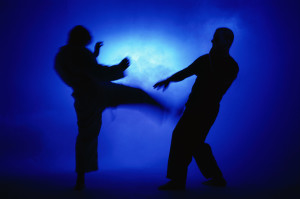“Every artist was first an amateur.”
Ralph Waldo Emerson
I began training martial arts in July 2004, just before my 23rd birthday. It quickly took over my life, and while the level of intensity in my training has waxed and waned with time, my passion and commitment to martial arts has not.
I write this on an upswing, having just attended five classes in four days at two different locations. Yet here’s the thing: I’m not very good.
I walked into a new school recently where they didn’t know me, the level of rank I’d achieved elsewhere or the impressive sounding things I had done.
Based on what I demonstrated, they started saying things like, “don’t worry, you’ll get it in time” and “if this is too hard you can modify it”. I found myself impatient, blustering, and frustrated as I was grouped with the people who’d never done martial arts before and seemed to be at their level.
Then I remembered something useful, and relaxed.
I don’t have to be good at this. I have never once approached my training with a goal in mind or an expectation for what I’d be able to do. I train because it meets a need, that is all. Lack of talent is actually a blessing in its way. It keeps me humble, and gives me the freedom to try without pressure to succeed.
I’m back to old habits, training as often as I can for as many hours possible at a time. There is evident improvement always, and the physical/emotional benefits for my life are clear. I keep my heart open and enjoy doing, never mind if I still lose my balance or sense of location when I close my eyes.
We don’t have to be good at things to do them. The usefulness of training martial arts has been apparent throughout my life, but if I made external factors the benchmark for my success I’d have given up a long time ago.
When we allow ourselves to do things for the joy of doing, we create unimaginable new opportunities for our lives. I recently started taking singing lessons, playing tennis, running obstacle courses, and meeting with financial advisors. I’m not especially good at any of these things and have perhaps embarrassed myself on more than one occasion, but the opportunities and gifts that come from doing far, far outweigh the fear that would stop me from trying.
Being good at something is an arbitrary assessment. It is a thought in our heads. It limits us to the things that come easiest, and cuts off the vast majority of our potential. My physical abilities are now far beyond what they would be if I’d stopped training because I didn’t believe I was any good.
I’ve recently taken on a lot of things beyond the sphere of my overt talents, and my mantra is “I don’t have to be good at it, I can just play”. Permission to be at the level I am at is all I need. Otherwise I wouldn’t have made it through my first singing lesson.
I would invite you to imagine something that you’ve always wanted to be able to do, and start doing it. It’s another way of saying yes to your heart, and opening a little bit more to the vast potential life.









Thank you for this post, it made me cry, I have always tried so hard to be “good” at doing, and I thought recently that I have never mastered anything, and this made me feel terrible, I would love to learn to do things just for the experience of it, the fun of it, and have the nerve to get it wrong and mess up. Of course the worst thing about all of this is the pressure I have but on my son, albeit unintentionally, but I have and I can see that he will only try things he thinks he will be good at. The circles of life ……
Thank you so much for sharing Carole. A point I don’t think I made as strongly as I would have liked is how judgments of being good or bad at things live in our heads and nowhere else. They’re just thoughts, not reality. Some people will be wildly impressed by your abilities, others won’t be, it doesn’t matter. You can train yourself to do things based on how they serve you. Like with all things, it becomes easier with practice, :-).